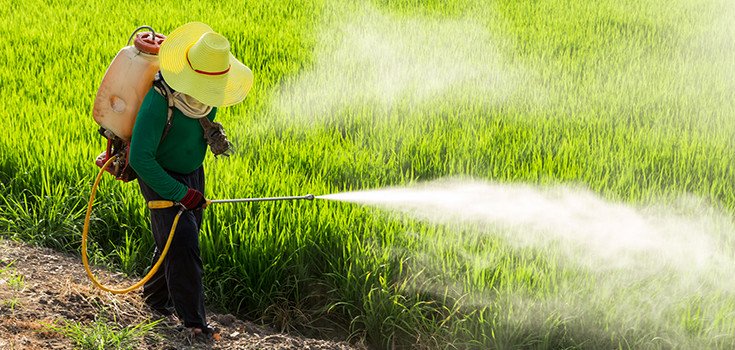34000 Pesticides and 600 Chemicals Later: Our Food Supply is No Better for It

More than 34,000 pesticides derived from about 600 basic ingredients are currently registered for use in the United States by the EPA. Industrial agriculture (meaning about 75% of all land used in the U.S. to grow food or raise animals) relies on these chemicals to grow food. Where, exactly has this gotten us? [1]
Billions of pounds of pesticides and herbicides used has resulted in:
- Pesticide exposure causes farm-workers to suffer more chemical-related injuries and illnesses than other work-forces. This has led farmers to suffer from organ damage and cancer, leading to numerous lawsuits against biotechnology and pesticide-creating companies like Monsanto.
- About 95% of the country relies on groundwater for drinking water, yet it is often contaminated by pesticides, especially in agricultural areas.
- Pesticide ‘drift’ is common now. This means that in places like California, you can’t take a deep breathe without inhaling pesticide chemicals.
- More babies are being born with preventable birth defects due to pesticide exposure.
- UC Berkeley has found that children are being exposed to pesticides even before they eat their first apple or munch on their first carrot. That’s because the chemicals are so prevalently used, they show up in breast milk of mothers.
- General population illnesses are on the rise, including asthma, autism and learning disabilities, birth defects and reproductive dysfunction, diabetes, Parkinson’s and Alzheimer’s diseases, and several types of cancer. Their connection to pesticide exposure becomes more evident with every new study conducted.
- Most of our food is laced with pesticide residues that cannot be washed off. Only organically-grown food is free from this concern.
- Genetically engineered crops developed and marketed to withstand copious herbicide and pesticide spraying are causing millions of acres of super weeds to grow, as well as causing super bugs which are resistant to the very chemicals which were created to destroy them.
- Pollinating insects which help to make sure we have a tremendous variety of foods have been absolutely decimated by chemical herbicides and pesticides. Bees, butterflies, and other pollinating insects are dying at an unprecedented rate.
- Even our ocean life is being contaminated by pesticide run off. Fish, crab, seals, and even micro-algae have been affected by the amount of chemicals we use to ‘grow food.’
- Agricultural practices that rely on this type of chemical addiction are stripping the soil of nutrients with remarkable implications. They are devastating the nutritional value of crops, making dramatic changes at an alarming rate — in less than a lifetime, to be specific. As an example, there has been a 41.1 to 100% decrease in vitamin A in 6 foods: apple, banana, broccoli, onion, potato, and tomato. Of them, both onion and potato saw a 100% loss of vitamin A in a 48-year span from, 1951-1999.
Despite these myriad concerns, the US Environmental Protection Agency gives the green light to a new concoction of health-harming chemicals used by Big Ag companies seemingly every month.
If 34,000 registered pesticides haven’t been enough to grow food for the world, certainly, new and more dangerous combinations of these chemicals will not magically solve the problem. Is it any wonder people are turning to organic farming practices and demanding organic, pesticide-free food?
Sources:
[1] McDaniel.edu

Christina, thanks for the articles to help keep us informed. Granted, you can’t provide volumes of data but give us starters, it is these starters which are used to springboard into other gateways. It’s not about the journey but the destination.
For the trolls who will try to claim all this as false, try digging into the data. Look at yourself in the mirror and ask who really cares about your health.
I’m concerned about the use of pesticides, but I’m also concerned about the exceptionally poor communication of science. The context and cause of a number of these claims in this article are being misconstrued.
For example, the claim about reduced reduced nutritional quality due to reduced soil nutrients completely ignores the very reasonable alternative explanation that conventional breeding and selection of different cultivars can cause this effect. This is extremely obvious as the quote states “there has been a 41.1 to 100% decrease in vitamin A in 6 foods: apple, banana, broccoli, onion, potato, and tomato.” See the glaring oversimplification? The claim refers to “apple” without specifically indicating which varieties of apples are being compared, much less how the comparison is being performed to come to the conclusion that there has been at least a 40% decrease. The content of polyphenols, for example, varies considerably between apple varieties. Furthermore, you would need to control for environmental differences to accurately determine changes in nutritional content. Basically, this claim is grossly oversimplified. And if it wasn’t bad enough already, the reference link is to a “natural health” company’s page, not a peer-reviewed independent source.
Similarly, attempts to link pesticides to “asthma, autism and learning disabilities, birth defects and reproductive dysfunction, diabetes, Parkinson’s and Alzheimer’s diseases, and several types of cancer” is equally fallacious. While pesticides may be a contributing factor in some cases of some of these diseases or conditions, there are many other potential causes. One very likely cause of increased Alzheimer’s rates is simply the fact that more people are living longer now and surviving other diseases, thus giving them the chance to (unfortunately) develop Alzheimer’s. Our sedentary lifestyle is also linked to diabetes and various cancers.
Yet again, if you are a fan of not thinking too much, Christina Sarich is your go-to writer.
Good informative article.
Many other sources support the points that Sarich has made. Try a search instead of grousing. Note also that Monsanto has been caught yet again BUYING scientists to produce pro-Monsanto so-called ‘science.’
Scientists
who become anti-GMO advocates are NOT shunned by the scientific community, but they Are ridiculed (an attempt to discredit) by Monsanto’s bought shills.
Thanks for the information. Great work. Keep it up.